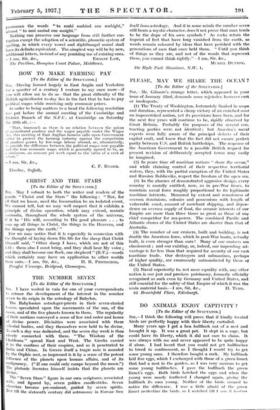THE NUMBER SEVEN
[To the Editor of the SPECTATOR.] Silt, -I have waited in vain for one of your correspondents to retrace the development of the interest in the number seven to its origin in the astrology of Babylon.
The Babylonian astrologer-priests in their seven-storied towers speculated upon the movements of the sun, of the moon, and of the five planets known to them. The regularity of their motions conveyed a sense of law and order and hence of divine power. Divinities were associated with these celestial bodies, and they themselves were held to be divine. To each a day was dedicated, and the seven day week is thus closely connected with them. "The Wisdom of the ( haldeans " spread East and West. The Greeks carried it to the confines of their empires, and so it penetrated to India and China. In Greece itself a tragic note is sounded by the Orphic sect,-so impressed is it by a sense of -the potent influence of the planets upon human affairs, and of its malignancy.. ("If one could only escape beyond the moon.") The platonic Socrates himself insists that the planets are divine.
The "Seven Stars" figure in our own scriptures, associated With, and figured by, seven golden candlesticks. Seven churches become preeminent, guided by seven spirits. Not till the sixteenth 'century did astronomy in Europe free
itself from astrology. And if in some minds the number seven still bears a mystic character, does it not prove that man tends to be the dupe of his own symbols ? As rocks retain the imprint of feet that have -long vanished from the earth, so words remain coloured by -ideas that have perished with the generations of men that once held them. " Until you think of things as they are, and not of the words that represent them, you cannot think rightly."—I am, Sir, &c., 16c Hyde Park Mansions, N.W. 1.
MURIEL DUTTO:s.4


























































 Previous page
Previous page